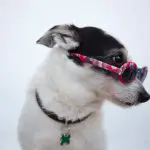Dog grooming instructions!
A clean doggy really is a happy doggy. Just ask your favorite pet! Ok, I know you can not really ask him or her, but some simple observation on your part can tell you their answer.
Regular grooming has different advantages, both for your pet and you.
It gives you an up close view of your pet allowing you to notice symptoms and problems your pet may be having and you might otherwise miss. Your personal bond with your dog is strengthened.
In addition, think of the money you will save by not having to pay a professional groomer for things that you can learn to do yourself, not to mention possible savings at the veterinarian by heading off costly illnesses.
Dental Care: Dog’s teeth can build up plaque and tartar the same as ours. Chips can occur and periodontal disease is a common problem. Teeth can become loose and fall out due to receding gums caused by this. What can you do? Brush his teeth!
Start when the dog is just a puppy and he will become so accustomed to it, it will be just a regular part of his or her routine. The best way to start is to use soft cotton the first few days, then slowly progress to a regular dog toothbrush.
Finger tooth brushes are a great idea. These can be purchased at your local pet store or through your veterinarian. Do not forget the toothpaste either, doggy tooth paste comes in all sorts of great flavours such as beef or chicken.. Special made brands for your pets are available also. As with our own brushes, watch for wear and replace as necessary.
Brushing and Caring for your Dog’s Coat: Again, start when the dog is just a puppy and they will become so accustomed to it, it will not be a problem or big deal. Depending on whether your pet is short or long hair will determine the amount of brushing required. Short haired dogs need to be brushed two to three times a week.
Long haired pets should be brushed daily. Look at it as time spent relating to your dog and the time will be spent doing double duty.
Different brushes are made for different hair types. Choose an appropriate one depending on length and type of coat. For dogs with extremely wiry or a coat that mats easily, look for a mat comb. Bathing your Pet
Only when necessary! That’s right, only bathe your dog when it is absolutely necessary. A dogs skin can dry out very easily. Use only a shampoo specially formulated for a dog. This will help keep his coat shiny and his skin moisturised There are many ‘dry’ bathing products on the market also. What about the actual bathing?
Think safety! A dog that again, is started when he is just a puppy will become accustomed to this and not react with fear. If you have a walk in shower, this is ideal. Walk right in with your pet and scrub away.
This is especially helpful if your dog is on the large side. For smaller pets, a regular tub can be used. With either, make sure the bottom of the tub or shower has a non-slip surface. Avoid your dog’s ears and eyes the same as you would on an infant.
Finally, rinse well, as soap left on the skin will irritate and do more harm than the original bath did good.
Ears and Eyes:
If your dog is destined to have ‘goopy’ eyes, get in the habit of wiping gently with a warm wash cloth. Nothing else should be done unless a veterinarian advises. Some dogs have allergies just like us and your vet may prescribe drops to help alleviate red or sore eyes.
Puppy’s ears should be checked regularly, but do no more than clip long hairs that seem to irritate him or her. By checking regularly though, you will notice if anything abnormal is cropping up. If redness or an odour occurs, or they get touchy about you touching the ears, this could signal a problem and you should direct this to your veterinarian immediately.
Clipping Toenails: In our house, the words ‘It’s time to clip Manta’s nails’ sends everyone running…as far away as possible. Manta is a sweet, gentle, older dog. By the time she came to be part of our family, she was well on her way to being a year old.
She never had her nails clipped as a young puppy, and did not acquire the habit that some dogs do of ‘chewing’ their own. If she had been having her nails clipped from early puppy on, she would probably just take it in stride as part of her normal routine.
Even at the age we started, she should have become accustomed to it.
She has not! She sees the clippers from across the yard and runs as fast as she can away from them. The whole time we are clipping them, she acts as if we are killing her; full moans and whines echoing across the room. As soon as we are finished, she retreats to her corner to sulk.
Because of all this, we try to make this as quick a process, but as safe as possible at the same time. Make sure and purchase a pair of clippers made especially for this.
They are not very expensive, and when they become dull, a new pair should be purchased to replace the old. Dull clippers will do more damage than good, cracking the nail and possibly leading to infection. Clip short, but not so short that it hurts.
Some dogs will stand and obediently let you pick up one paw at a time. Others can be coaxed to lie down on their side giving you easy access to the paws.
Remember that any time spent grooming your pet is time not wasted. It will lead to a healthier, longer living animal, and that means you will have your best friend around that much longer to enjoy!


